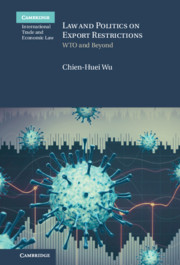3 results
1 - Introduction
-
- Book:
- Law and Politics on Export Restrictions
- Published online:
- 09 July 2021
- Print publication:
- 29 July 2021, pp 1-19
-
- Chapter
- Export citation
2 - Energy’s Place in International Trade Law History
- from Part I - Energy in International Trade Law: Concepts, History and Legal Framework
-
- Book:
- Energy in International Trade Law
- Published online:
- 24 June 2021
- Print publication:
- 15 July 2021, pp 35-65
-
- Chapter
- Export citation

Law and Politics on Export Restrictions
- WTO and Beyond
-
- Published online:
- 09 July 2021
- Print publication:
- 29 July 2021

